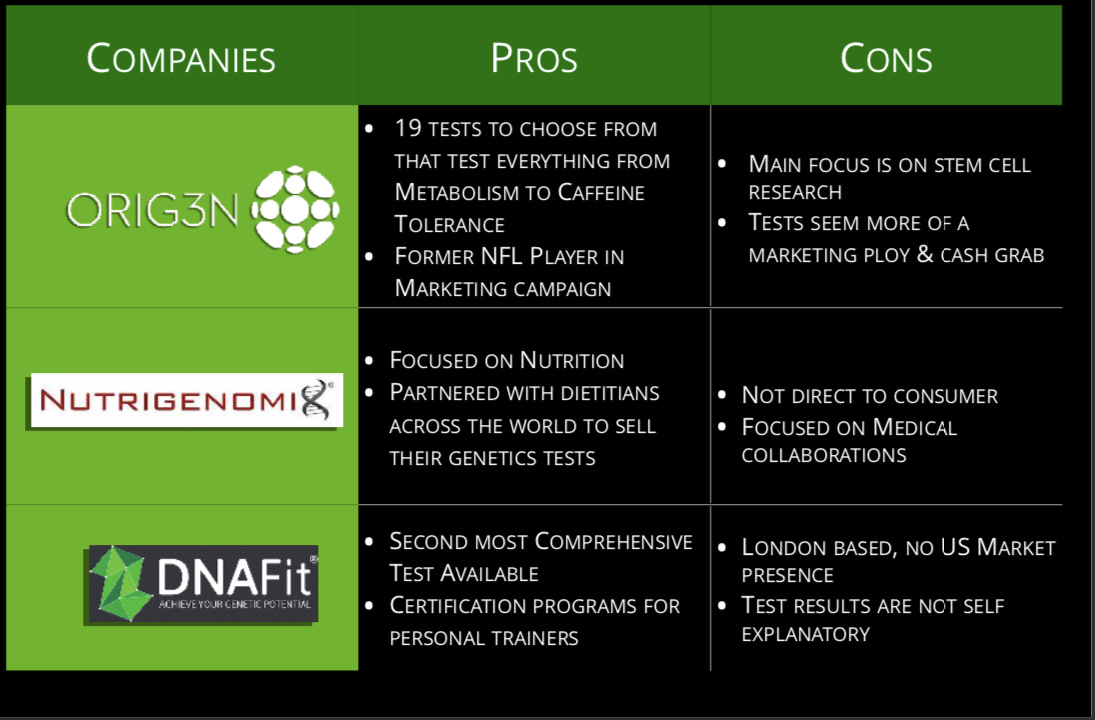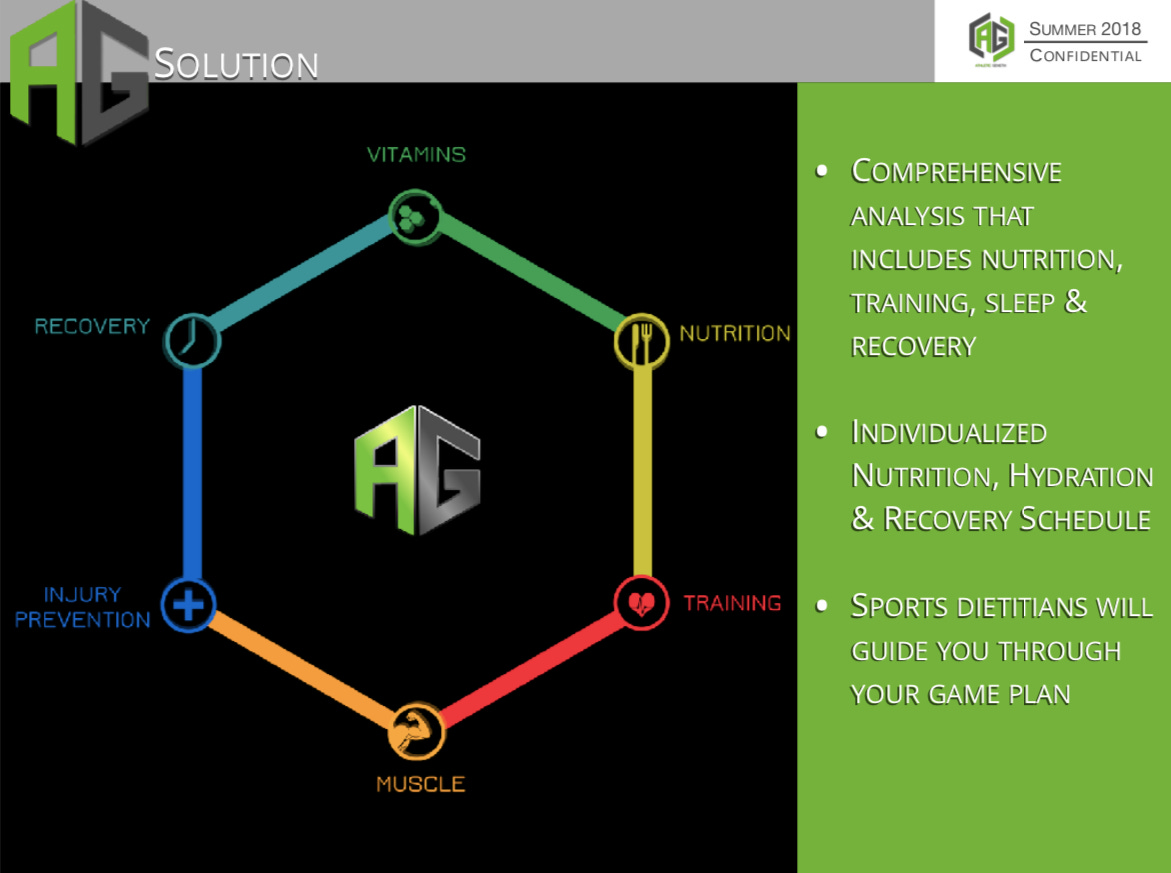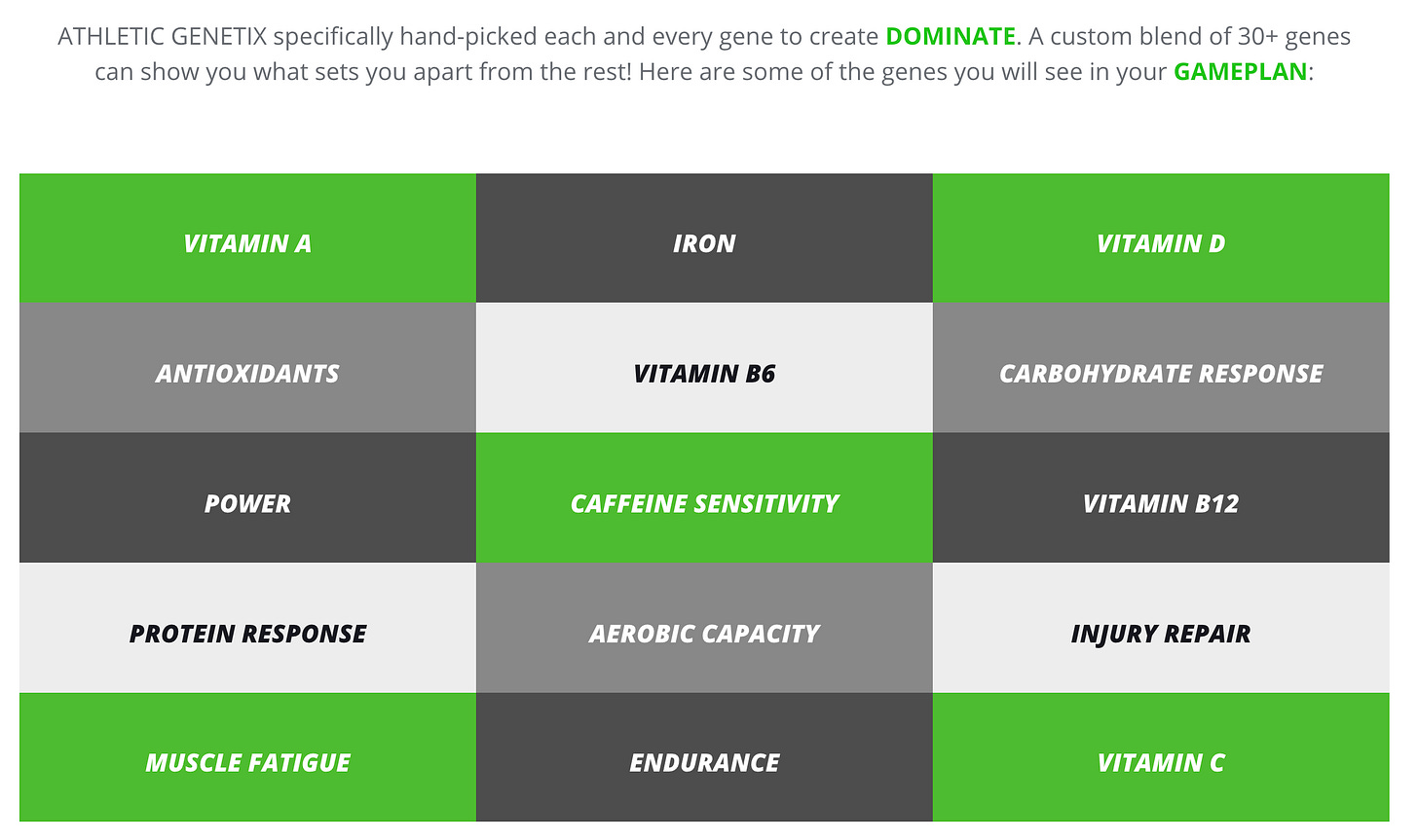How pro teams are using DNA testing to help improve players’ training, sleep, and nutrition
Over the past few years, the DNA testing market has gone from being a niche market to a mass market thanks to companies like 23andme and Ancestry.com. We are also seeing a growing number of insurance companies like MassMutual teaming up with DNA sequencing startups in order to provide users with insight into health status and risk for disease, details on which pharmaceuticals may work better for them, carrier status for family planning decisions, along with ancestry and personal traits.
So how many people have used DNA testing so far?
Four companies now have DNA information on more than 26M people in the US alone. That’s roughly the combined population of New York State (About 20M), Connecticut (3.5M) and Chicago (2.7M).
Nowadays DNA testing kits have also become a hot seller. For example, back in 2018, AncestryDNA sold 1.5 million genetic testing kits over the Black Friday weekend.
Not surprisingly, according to MIT Technology Review , the number of people who submitted their most personal genetic details to companies including 23andme and Ancestry.com doubled in 2018. At that rate, 100M people will have provided information about their DNA make-up to private companies by the end of 2020.
How big is the DNA testing market in terms of revenue opportunity?
The consumer market for DNA testing alone is expected to nearly triple from about $99M in 2017 to $310M in 2022, according to market research firm Kalorama Information.
So is DNA testing applicable to the world of elite sports?
In the past few years, a growing number of pro teams have started to adopt DNA testing products as a way to provide custom nutrition plans to athletes which will help improve performance in the long run.
So who are the main players in the sports DNA testing market?
There are essentially 4 main companies in the sports DNA testing market today: Those include companies like Athletic Genetix, DNAFit, Nutrigenomix, and Orig3N.
As shown in the table below, ORG3N essentially offers 19 tests that test everything from metabolism to caffeine tolerance. They are essentially focusing on stem cell research today. Nutrigenomic, on the other hand, is focusing on nutrition. To do so it teamed up with dietitians across the globe to sell their genetic tests. It it also worth pointing out that they do not sell direct to consumers but are focused on medical collaborations.
 DNAFit, another key player, has a certification program for personal trainers. The company, which is based in London, is not currently focused on the US market. It is worth pointing out that soccer star Rio Ferdinand has been an ambassador for DNAfit in order to drive the awareness of the company and the work that they are doing in the DNA sequencing market.
DNAFit, another key player, has a certification program for personal trainers. The company, which is based in London, is not currently focused on the US market. It is worth pointing out that soccer star Rio Ferdinand has been an ambassador for DNAfit in order to drive the awareness of the company and the work that they are doing in the DNA sequencing market.
Video: DNAfit
As shown in the graph below, Athletic Genetix, another key player in the space, is going one step further. Aside from the DNA test, they are offering to teams a full analysis that includes nutrition, training, sleep and recovery. Concretely, they can offer individualized nutrition, hydration and recovery schedule to players. To do so, as part of their offering, they make sports dietitians available to teams in order to guide players and teams through a game plan.
Athletic Genetix is also unique in the market as it is able to provide a custom blend of 30+ genes. More precisely for each player it is able to look at things like muscle fatigue, endurance, aerobic capacity, carbohydrate response, and so on.
So at what stage of adoption is currently DNA testing among pro teams?
Based on our sources, we are still in the early stage of adoption when it comes to DNA testing. In other words, the adoption remains fairly low among pro teams due to several reasons:
(1) Awareness: There is a lack of awareness among pro teams in terms of how DNA testing can be used by teams to improve the health and performance of players.
(2) Data privacy: Players and even coaches that we talk to are often concerned about the data privacy. What is a sports team discovers that a particular player has a disease after taking a DNA test? This is probably the biggest restraining factor for many players, coaches and teams. This could have serious consequences on the career of players.
How useful are DNA testing for pro teams? How can it help improve the performance of players?
Based on conversations that we have had with several vendors, the results have been very promising so far. For example, a major international soccer team has used DNA testing on several players. The result? It has helped this particular team better provide custom nutrition plans to players and ultimately improve the individual performance of players.
So what should teams do when deciding to adopt DNA testing?
In our view, before deciding to adopt DNA testing, teams should follow these footsteps:
(1) Clearly define your goals before adopting DNA testing: Teams should always define their goals before considering DNA testing. For some teams their goals might be to help their players improve their sleep while other teams might want to better provide custom nutrition plans to their players. These goals need to be well defined before starting anything.
(2) Go with a vendor that can provide a full analysis and the appropriate support: In our opinion, it is always best to work with a vendor that can offer a full analysis with the appropriate support. This is why we think that vendors like Athletic Genetix have an interesting value proposition as they offer a full analysis that includes nutrition, training, sleep and recovery, and make sports dietitians available to teams in order to guide players and teams through a game plan. What matters with DNA testing is the interpretation of the data and having this level of support is critical.
(3) Start small and use DNA testing initially on a small number of players who need it most: Before widely deploying DNA testing within a team we believe it is best to start small and instead identify players who could be great candidate for this. This could include players who have historically had sleeping issues, have been fatigued or need specific diet. By doing so it will help increase the chance of success when using DNA testing.
(4) Fully understand the data privacy policy of each vendor: Data privacy being one of the most sensitive aspects of DNA testing we believe that it is critical for teams to take the time to fully understand the data privacy of each DNA testing vendor. In other words each vendor needs to have a clear policy on how the DNA data will be used, for what purpose. Teams also want to make sure that such data is not going to be shared with any third parties companies.
Bottom line: We believe that the sports genomic market is still in its infancy as a limited number of teams have so far adopted DNA testing. The biggest challenge for higher adoption remains awareness and data privacy. That being said, based on our feedback we are seeing an increasing number of teams looking at potentially using DNA testing to supplement the work they are already doing to improve training, nutrition and sleep. Lastly, we also believe that sports DNA genomic vendors who can provide a full analysis along with the right level of support (e.g. dietitians) will prevail in the long run.



Leave A Comment
You must be logged in to post a comment.